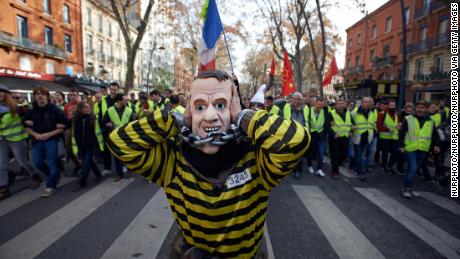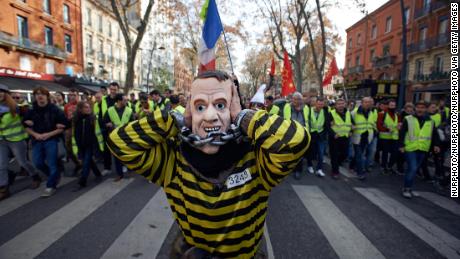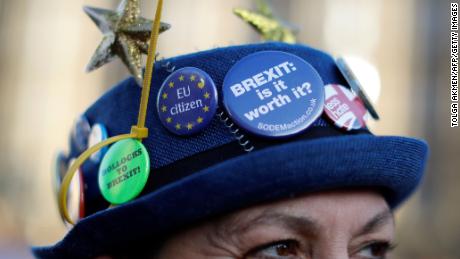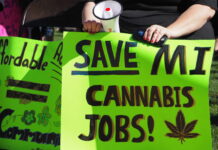Populists will claim they have the answers; traditionalists will say nothing is wrong they can’t fix.
But be sure of one thing: Our old, comfortable order is going to change — and not in an incremental way that we can more or less handle.
While 2019 might not be the year we actually tip, it seems inconceivable that the balance between those who are happy as we are and those who think the world no longer works for them is going to shift.
We are more populous. Our need for resources is greater. Our expectations more immediate. And while our capacity for change is elastic, this planet’s provision for that change is finite.
The generation that never had it so good risks handing off the hangover of its excess and inaction to its children.
To know 2019, look across Europe in 2018.
Activism is on the rise. New and savvy social media movements are gaining momentum, from climate change demonstrators shutting down central London to “yellow jacket” protesters opposed to climate control legislation ripping up central Paris.
For each ugly manifestation of street anger, a chilling iceberg of discontent lurks below the surface. Brexit is a case in point: It captured popular imagination as a way to control immigration, among other things, but is now tearing up Europe’s cohesion.
What began 2018 as an already messy divorce has descended into bitter cross-channel vitriol that will only get worse next year.
Europe suddenly looks shaky.
That alone might not be so bad for global stability were it not for the fact that the United States, the nation that shaped today’s Europe, is turning its back on the continent.
President Donald Trump made clear in 2018 that he doesn’t much care for Europe. He undermined British Prime Minister Theresa May, lambasted German Chancellor Angela Merkel and has been openly hostile to French President Emmanuel Macron. In short, he is shunning America’s natural allies.
Trump is turning 2019 from a potentially treacherous year into a downright dangerous one — and not just because of Europe.
He has raised tensions with China and engaged in the farcical and dangerous delusions of defanging Kim Jong Un of his nuclear weapons. He has appeased Saudi Crown Prince Mohammed bin Salman over the killing of journalist Jamal Khashoggi and cozied up to Vladimir Putin while sanctioning Russia.
But perhaps most destructively, by shunning his Defence Chief James Mattis out of office, he has lifted the brake on his most misguided overseas impulses. By drawing down US forces in Syria to zero and Afghanistan to half, he has exposed his paltry grasp on what actually keeps Americans, their interests, and global stability on an even keel.
2018 has revealed his foreign policy to be a sham.
Ahead of his meeting with Putin over the summer, Trump declared himself “a very stable genius.” But next to the Russian President, he looked like a serial loser.
He failed to hold Putin to account in the attack on the 2016 presidential elections that got him elected, just as he failed a month earlier to get the North Korean dictator to give up his nuclear weapons.
Trump’s biggest asset is his unpredictability — such as trade tariffs on China to pressure it into reining in its predatory practices. This is at least something for which he has global backing. But his wild behavior in other areas undermines this.
Allies such as Saudi Arabia, aided by sophisticated first world consultancies, have found his weaknesses: overly simplified foreign and transactional relationships, such as the weapons sales he cited when failing to hold bin Salman to account in Khashoggi’s killing.
He occupied a large place on the global stage in 2018. Not just because he is the most powerful man on the planet, but because the way he wielded that power has been polarizing.
Earlier this year, I wrote that we are drifting apart, that Trump is an accelerant in the populist politics of division.
As the year draws to a close and Trump faces a 2019 looking inward to the myriad investigations he faces at home, he will no doubt turn his back on surging global turbulence.
China’s global ambitions rise, Putin needles his neighbors, Kim is the nuclear can still being kicked down the road, and Iran seethes at new US sanctions and girds for a regional showdown with Saudi Arabia.
Ever since Trump took office, it was assumed that Europe would uphold the international order. But the Old Continent faces enough of its own threats on many fronts in 2019: Putin to the East, Turkey’s Recep Tayyip Erdogan to the south, Trump to the west. Yet its own internal problems weaken it the most.
Just a year ago, France’s Macron seemed special, a fresh generation of thinking offering a seductively broad political church, riding high in the polls. Fast-forward to now, and his popularity has plummeted.
In Germany, Merkel, once Europe’s much applauded moral compass, has been replaced as party chief and rendered a lame-duck Chancellor.
And in the UK, May’s handling of Brexit has forced her to surrender political ambition to keep her job.
In each of these leading nations discontent is growing. Rifts in society on immigration and so much more are widening. Political rows between those countries are escalating as they stretch to hold together the Europe they want.
Across 2018, the intensity of the challenges facing Europe’s leaders has taken its toll.
To see how, look no further than mid-December in Brussels. With a little more than three months until Brexit day, May uncharacteristically got in the face of the European Commission’s Jean-Claude Juncker, challenging him about what he may or may not have said about her. Later he uncharacteristically warned Britain’s lawmakers to dial back anti-European Union rhetoric.
It’s a sign of how far things have come in a year, and a warning of where they could go in 2019.
Brexit negotiations were always going to be tense. The logical brake on all of that would have been the United States.
The idea now that Trump has the desire, ability or credibility to wrap his arms around this issue — or any simmering global spat — is beyond improbable.
Absent of America’s positive influence on global affairs, Trump’s populist style of politics, increasingly aped by other leaders, will leave us all longing for bygone certainties and stability.
The world is more interlinked and interdependent than at any time in history: From the toe bone to the head bone, we are connected and can ill afford the fractures that could await us next year.
It has taken two generations to repair the last global unraveling of the Second World War. Rifts are the last thing humanity needs right now.
Views: 449















